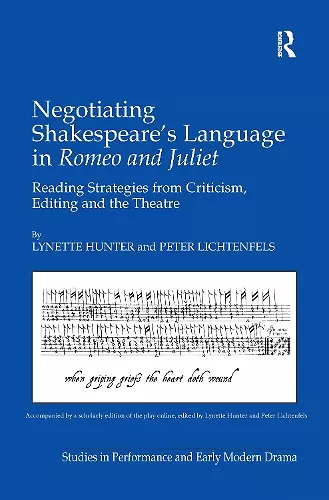Negotiating Shakespeare's Language in Romeo and Juliet
Reading Strategies from Criticism, Editing and the Theatre
Lynette Hunter author Peter Lichtenfels author
Format:Paperback
Publisher:Taylor & Francis Ltd
Published:11th Nov '16
Currently unavailable, and unfortunately no date known when it will be back
This paperback is available in another edition too:
- Hardback£150.00(9780754658443)

Through exciting and unconventional approaches, including critical/historical, printing/publishing and performance studies, this study mines Shakespeare's Romeo and Juliet to produce new insights into the early modern family, the individual, and society in the context of early modern capitalism. Inspired by recent work in cultural materialism and the material book, it also foregrounds the ways in which the contexts and the text itself become available to the reader today. The opening material on critical/historical approaches focuses on the way that readers have frequently read and played the text to explore issues that cluster around the family, marriage, gender and sexuality. Chapter two, on the ways that actors today inhabit character and create behaviour, provides intertextual comment on acting in the early modern period, and the connections between acting and social behaviour that inform self-image and the performance of identity both then and now. The third chapter on printing/publishing approaches to the text offers a detective story about the differences between Quarto One and Quarto Two, that focuses on the curious appearance in Quarto Two of material related to the law at word, phrase, line and scene level. The next three chapters integrate a close study of the language of the play to negotiate its potential significance for the present in the areas of: Family, Marriage, Gender and Sexuality; Identity, Individualism and Humanism; and the Law, Religion and Medicine. Among the startling aspects of this book are that it: - takes the part of Juliet far more seriously than other criticism has tended to do, attributing to her agency and aspects of character that develop the part suddenly from girl to woman; - recognizes the way the play explores early modern identity, becoming a handbook for individualism and humanism in the private domestic setting of early capitalism; and - brings to light the least recognized element in the play at the moment, its demonstration of the emerging structures of state power, governance by law, the introduction of surveillance, detection and witness, and the formation of what we now call the 'subject'. The volume includes on DVD a scholarly edition with commentary of the text of Romeo & Juliet, which re-instates many of the original early modern versions of the play.
'The authors do an excellent job exploring what they call "the border between bibliography and literary criticism, on the one hand, and the performance history of theatre practice and contemporary production strategies, on the other" to reveal alternative ways of understanding Romeo and Juliet. This will become essential reading for students, teachers, scholars, and all theatre professionals interested in Shakespeare's great romantic tragedy.' Jay L. Halio, University of Delaware, USA ’From the deadly first word of its title onwards, Negotiating Shakespeare's Language in Romeo and Juliet is an exemplary piece of contemporary textual scholarship. ... will interest those who want to know how the printed book and the internet may best complement one another ... Here is perhaps the most careful and thorough account yet of the play's textual history, in a very wide sense.’ Times Literary Supplement
ISBN: 9781138259591
Dimensions: unknown
Weight: 453g
254 pages